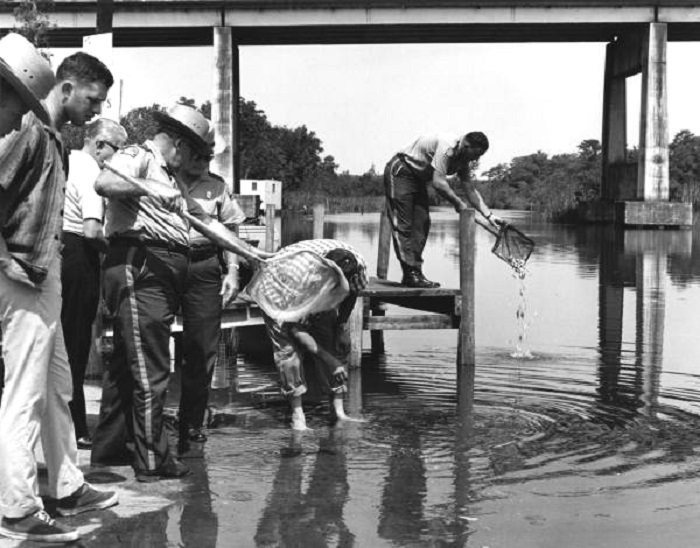
The Florida Fish and Wildlife Conservation Commission (FWC)’s Blackwater Hatchery is celebrating 80 years of operation on Friday, Aug. 14. Since 1940, Blackwater has produced tens of millions of fingerling and subadult freshwater fish that have been stocked in Florida’s freshwater lakes and rivers. The hatchery is in Santa Rosa County, approximately five miles west of Holt, within the Blackwater River State Forest.
Original construction of what was then known as the Blackwater River State Fish Hatchery and Game Farm began in the late 1930s as a joint project between the then-Florida Board of Forestry and the U.S Department of Agriculture. The project was completed in 1940 and turned over to the former Game and Fresh Water Fish Commission to manage and develop production techniques. Species produced at the hatchery include largemouth bass, Gulf Coast striped bass, white bass, hybrid bass, shoal bass, black crappie, bluegill, redear sunfish, channel catfish and threadfin shad.
Today, Blackwater Hatchery produces and stocks between 600,000 and 1 million fingerling and subadult freshwater fish annually in public waterbodies throughout Florida to meet conservation goals and the needs of anglers. All hybrid striped bass and Gulf Coast striped bass stocked by the FWC in Florida waters originate from spawning conducted at the hatchery. The FWC is part of a tri-state agreement to conserve and restore the Gulf Coast striped bass population. The only remaining Gulf Coast striped bass populations found in northwest Florida coastal rivers today are a result of fish produced and stocked by the hatchery.
Recently, Blackwater Hatchery has begun investigating techniques for successfully spawning shoal bass in hatchery ponds. Shoal bass are a riverine species of black bass and Florida’s only pure population is found in the Chipola River. Due to limited suitable habitat and their restricted range, shoal bass are listed as a Species of Greatest Conservation Need. The shoal bass population in the Chipola River and its tributaries were negatively impacted by Hurricane Michael. Development of successful hatchery spawning and rearing techniques will be important in ensuring the long-term health and survival of this population.
Blackwater Hatchery will continue to play an integral role in the Division of Freshwater Fisheries Management’s efforts to sustain and conserve Florida’s bountiful freshwater fish populations as we move into the next 80 years and beyond.
For more information about the Division of Freshwater Fisheries Management, contact Laura Rambo at 850-488-0520 or Laura.Rambo@MyFWC.com.





































